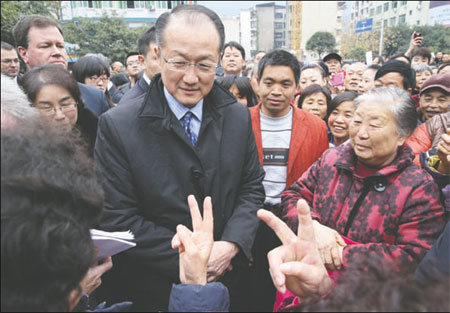Growth cuts role of China in global poverty fight
Updated: 2013-05-02 11:29
By Chen Weihua in Washington (China Daily)
|
||||||||
|
World Bank President Jim Yong Kim visits Yanting, Sichuan province, in December, where residents were helped by a Bank-funded project to rebuild after the 2008 earthquake. Kim said China's role in reducing global poverty will be limited. Wu Zhiyi / China Daily |
The goal of ending poverty on Earth by 2030 remains a daunting task, partly due to a reduced role in the fight played by China in the coming years, according to experts and the head of the World Bank.
World Bank President Jim Yong Kim on Wednesday restated the institution's pledges to cut to 3 percent by 2030 the number of people who live on less than $1.25 a day and address the challenge of shared prosperity for the bottom 40 percent of income-earners in any society, especially in developing countries.
Setting a target with an end date is important, Kim told a meeting of InterAction, a Washington-based international nongovernmental organization that funds and administers anti-poverty projects.
According to the World Bank, the global rate of extreme poverty - defined as people living on less than $1.25 a day - fell to 20.6 percent in 2010 from 43.1 percent in 1990. That success means the Millennium Development Goals set by the United Nations to halve global poverty by 2015 was achieved five years early. However, 1.2 billion people around the world were still in extreme poverty as of 2010.
Kim, at a different conference last week, said the world faces "a very, very hard task" ahead.
"We did great work from 1990 to 2010, when we halved the poverty rate, but a lot of the success was due to the fact that China grew so rapidly economically and lifted 600 million people out of poverty," he said on April 24.
According to World Bank data, there were 660 million fewer Chinese people living on less than $1.25 a day in 2008 than in 1981.
"Now, what's left is a lot of really hard work," Kim said. "We've got to make progress in South Asia, we've got to make progress in sub-Saharan Africa.
On Wednesday, Kim said the World Bank is "full of people who want to fight poverty, and development is fundamentally an optimistic enterprise".
He also expects the Bank, which lends money to member governments for development projects, to cut bureaucracy and speed its procedures. Kim praised the role of the institution's private-sector affiliates, the International Finance Corp and the Multilateral Investment Guarantee Agency, in poverty-reduction efforts.
Kim recently traveled to Chengdu, in southwestern China's Sichuan province, where he met a woman whose auto repair shop was set up with a $10,000 loan from a local bank through an IFC-backed program. The owner now has three shops and has hired 150 people, including many women.
Laurence Chandy, who researches international development and governance at the Brookings Institution, said much of the progress in reducing global poverty over the past 20 years can be attributed to China. He said, however, that the country can no longer propel this effort because its own level of extreme poverty is now relatively low.
World Bank data show that 11.8 percent of Chinese were living on less than $1.25 a day in 2009, down from 43 percent in 1981.
"Around now, we start to see that driving global progress really has been passed from China to India," Chandy said.
Once a nation's extreme-poverty level falls below 10 percent, the rate of poverty reduction slows down, he explained.
"China has completed its task in driving global progress, and we will see if India can play the same kind of role China has," he said.
In China, the creation of a huge number of manufacturing jobs and the fast rate of urbanization set an example for India and many African countries to follow in fighting poverty, the researcher said.
"China is really the best of that and we have not seen the kind of job creation in India as in China."
He pointed out, however, that despite China's impressive record of poverty reduction through economic growth, it has been less successful in spreading prosperity widely. Income inequality has been rising for a long time among the Chinese populace.
China's Gini coefficient, which measures income distribution, was 0.47 in 2012, according to the National Bureau of Statistics. That is a historical high and places China among the most income-unequal countries in Asia and the world.
chenweihua@chinadailyusa.com

 Michelle lays roses at site along Berlin Wall
Michelle lays roses at site along Berlin Wall
 Historic space lecture in Tiangong-1 commences
Historic space lecture in Tiangong-1 commences
 'Sopranos' Star James Gandolfini dead at 51
'Sopranos' Star James Gandolfini dead at 51
 UN: Number of refugees hits 18-year high
UN: Number of refugees hits 18-year high
 Slide: Jet exercises from aircraft carrier
Slide: Jet exercises from aircraft carrier
 Talks establish fishery hotline
Talks establish fishery hotline
 Foreign buyers eye Chinese drones
Foreign buyers eye Chinese drones
 UN chief hails China's peacekeepers
UN chief hails China's peacekeepers
Most Viewed
Editor's Picks

|

|

|

|

|

|
Today's Top News
Shenzhou X astronaut gives lecture today
US told to reassess duties on Chinese paper
Chinese seek greater share of satellite market
Russia rejects Obama's nuke cut proposal
US immigration bill sees Senate breakthrough
Brazilian cities revoke fare hikes
Moody's warns on China's local govt debt
Air quality in major cities drops in May
US Weekly

|

|









